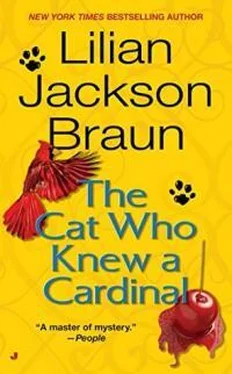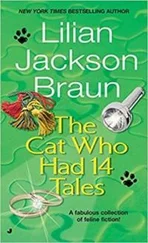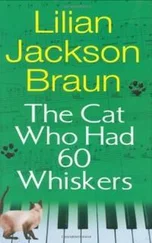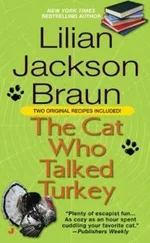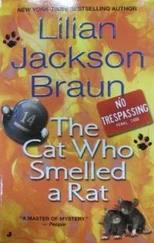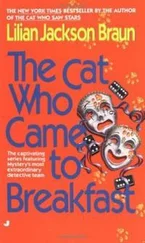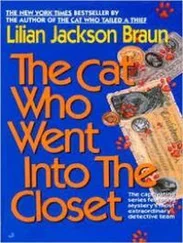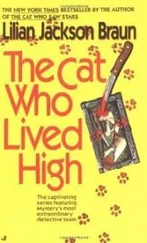"Hope it doesn't drop and kill a cat," said the installer with a grin.
"If it does," Qwilleran said, "I'll be after you with a shotgun."
"The other tapestry will be easy," Fran assured Shawn. "We'll hang it on the blank wall of the fireplace cube, facing the foyer, and it's a little smaller."
"Why'n't ya put the heavy one down here?" he asked. Again the wrappings were removed, and the tapestry was unrolled on the floor - a galaxy of birds and green foliage.
"Yow!" came a comment from the fireplace cube, and Koko jumped to the floor. Birds native to Moose County were flitting among weeds, grazing on the ground, sipping nectar from flowers, warbling from tree branches, and swaying on tall grasses. He walked purposefully across the tapestry and sniffed the red bird with black face patch and red crest.
"Amazing!" Qwilleran said.
The bird extravaganza was hung and admired, and then Fran glanced at her watch. "I can't hang around," she said. "This is my mother's birthday, and Dad and I are taking her out to dinner. When are you leaving for Lockmaster, Qwill?"
"After the funeral."
"Have a good time at the races. Don't lose all your money."
Qwilleran was glad to avoid socializing. He wanted to stay home and plan his trip and learn how to pack his new luggage. It was the last word in nylon with leather bindings and straps and more pockets and compartments than he needed. It replaced his two old suitcases lost in a disaster Down Below. Imitation leather, scuffed and battered, they had traveled with him from city to city during his lean years. Polly said they were a disgrace. He said they were easy to pack. "Just throw everything in."
After dinner, when he opened his new luggage on the bed to consider its complexities, Koko moved into the two- suiter and Yum Yum took possession of the carry-on. He left them sleeping there and settled down with the Thursday edition of the Lockmaster Logger.
The race course, he learned, was a little over two miles - in a natural setting surrounded by gentle hills from which viewing was convenient. For first- time race goers there were instructions for reading the race chart: the name of the horse and the weight he was carrying; the names of owner, trainer, and rider; the color of the racing silks; the horse's color, sex, and age; the names of sire and dam. Such details were more than Qwilleran cared to know.
There was only one entry that aroused his interest: Robin Stucker would be riding in a race that permitted amateurs. He asked himself: Wasn't Stucker the name of the woman who played Queen Katharine? Didn't her note to VanBrook mention that she had to buy boots for Robbie? The horse, according to the chart, was owned by W. Chase Amberton. The trainer was S. W. O'Hare. The name of the horse - and this was what caused Qwilleran to smooth his moustache in speculation - was Son of Cardinal.
-8-
The funeral on Friday morning was a doubly somber affair attended by a few members of the Theatre Club - doubly somber because many of the mourners thought they were saying farewell to a murderer as well as a suicide. No one mentioned it, but glances were exchanged as the pastor of Larry Lanspeak's church spoke his ambiguous platitudes. Only the Lanspeaks and Fran Brodie believed stubbornly that the rumor was false. Only Qwilleran, Hixie Rice, and Chief Brodie knew the truth. Brodie was there - not in uniform but in kilt and tam-o'-shanter- playing a dirge on the bagpipe at Qwilleran's suggestion.
"It will allay suspicions without formally denying them," he told the chief.
Hixie drew Qwilleran aside and said in a low but emotional voice, "It's frustrating, isn't it? Why don't the police come up with a suspect? Why don't you do something about it, Qwill?"
He said, "It happened only a week ago, Hixie. The police have information not available to me. What's more, they have computers."
"But you solved the Fitch murders when the police were stymied. And you identified the killer at the museum before anyone knew there was a murder!"
Qwilleran massaged his moustache thoughtfully: He was reluctant to reveal that it was Koko's inquisitive sniffing and catly instincts that had turned up the clues. Only his closest friends and a few journalists Down Below knew about the cat's aptitudes, and it was better to leave it that way. "I'll think about it," he told Hixie.
He thought about it as he packed his binoculars and dinner jacket for the weekend at the races. Getting away from Pickax, he hoped, would restore his perspective. For the cats he packed some canned delicacies and vitamin drops, their favorite plate and water dish, the turkey roaster that served as their commode, and a supply of kitty gravel. This was to be their first experience as house guests. Qwilleran was nervous about the prospect, but Koko hopped into the travel coop eagerly - a good omen - and scolded Yum Yum until she followed suit.
When they pulled away from the barn, the route took them south past the potato farms and sheep ranches - and the usual dead skunk on the highway, which caused a flurry of complaints from the backseat. As they neared the county line, Qwilleran began to notice the name Cuttlebrink on rural mailboxes and then suddenly a roadside sign:
WELCOME TO WILDCAT POP. 95
A few hundred feet beyond, another sign suggested that the Cuttlebrinks had a sense of humor:
YOU JUST PASSED WILDCAT
Qwilleran eased on the brakes and made a U turn slowly and carefully. Any sudden stop or start, or any turn in excess of twelve degrees, upset Yum Yum's gastrointestinal apparatus and caused a shrill protest - or worse. Returning to the crossroads that constituted downtown Wildcat, he counted a total of four structures: a dilapidated bar, an abandoned gas station, the remains of an old barn, and a weathered wood building with a faded sign:
CUTTLEBRINK'S HDWE. & GENL. MDSE. ESTAB. 1862
The windows, he guessed, had last been cleaned for the centenary of the store in 1962. The frame building itself had last been painted at the turn of the century. As for the items faintly visible through the dirty glass (dusty horse harness, fan belts, rusty cans of roof cement), they had evidently been dropped there at some point in history, and no one had ever happened to buy them.
The interior was dimly lighted by low- watt lightbulbs hanging from the stamped metal ceiling, and the floorboards - rough and gray with age - were worn down into shallow concavities in front of the cash register and the tobacco case. In the shadows a man could be seen sitting on a barrel - a man with a bush of yellowish-white whiskers and strands of matching hair protruding beneath his feed cap.
"Nice day," he said in a high-pitched, reedy voice.
"Indeed it is," said Qwilleran. "We're having beautiful weather for September, although the weatherman says we can expect rain in a couple of days." He had learned that discussion of the weather was one of the social niceties in Moose County.
"Won't rain," the old man declared. While speaking, Qwilleran had been perusing the merchandise on shelves, counters, and floor: kerosene lanterns, farm buckets, fish scalers, flashlights, rolls of wire fencing, light bulbs, milk filters, corncob pipes... but no clay pipes.
"He'p ya?" asked the old man without mpving.
"Just looking around, thank you."
"No law 'gainst that!"
"You have a remarkable assortment of merchandise."
"Yep."
There were nails by the pound, chains by the foot, rat traps, wooden matches, wire coat hangers, some things called hog rings, button hooks, work gloves, and alarm clocks. "I've seen some interesting stores, but this tops them all," said Qwilleran sociably. "How long has it been here?"
"Longer'n me!"
"Are you a Cuttlebrink?"
"All of us be Cuttlebrinks."
Qwilleran continued his search, trying to appear like a casual browser. He found rubber boots, steel springs, plungers, tarpaulins, more fan belts, fifty-pound salt blocks, gnaw bones for rabbits, dill pickles, ammunition... but still no bubble pipes. Examining a cellulose sponge - which, according to the label, would clean, sanitize, and remove manure - he asked, "Is this a good sponge?"
Читать дальше
